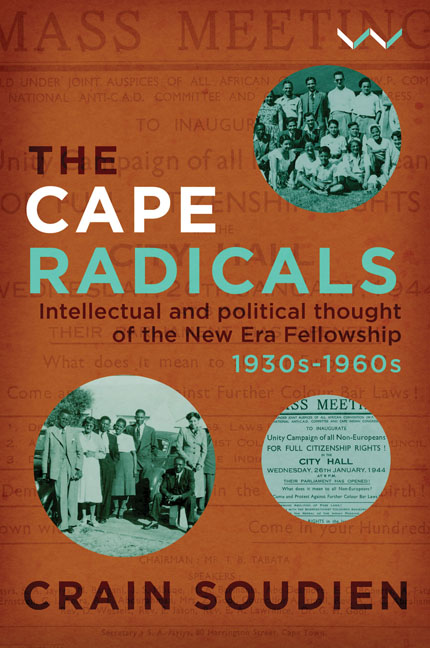Book contents
- Frontmatter
- Contents
- Acknowledgements
- Acronyms and Abbreviations
- Timeline
- Introduction
- 1 A Battle of Ideas
- 2 Planters of the Seed
- 3 ‘Anything under the Sun’: The Formation of the New Era Fellowship
- 4 ‘Honest, Sincere and Fearless’, 1937–1940
- 5 The Road to Emancipation, 1940–1953
- 6 A Cauldron of Conflict
- 7 Legacy
- Notes
- List of Illustrations
- Bibliography
- Index
Introduction
Published online by Cambridge University Press: 29 October 2019
- Frontmatter
- Contents
- Acknowledgements
- Acronyms and Abbreviations
- Timeline
- Introduction
- 1 A Battle of Ideas
- 2 Planters of the Seed
- 3 ‘Anything under the Sun’: The Formation of the New Era Fellowship
- 4 ‘Honest, Sincere and Fearless’, 1937–1940
- 5 The Road to Emancipation, 1940–1953
- 6 A Cauldron of Conflict
- 7 Legacy
- Notes
- List of Illustrations
- Bibliography
- Index
Summary
In 1937 a small group of young Cape Town intellectual-activists made the decision to establish a cultural society for the purpose of, as they put it in their constitution, ‘spreading enlightenment’. They called the society the New Era Fellowship (NEF). And so began an ambitious process of public education with the ordinary people of Cape Town. Their aim was to bring into being an organisation that would disrupt prevailing ruling-class thinking, which said that some people were naturally superior and others inferior. Integral to this disruption was making available to people the best thinking and opinions on a range of issues and subjects. ‘We will discuss anything under the sun,’ they announced to the people of Cape Town in 1937.
A variety of forums were put in place: study circles, debating societies and cultural initiatives. These in turn were catalysts for new political formations, civic organisations and formative social organisations. Over a period of about 25 years the NEF introduced into the cultural life of Cape Town not only a sense of entitlement to dignity but also an awareness of new human possibility. In the process they made important contributions to the city on a local level. In rejecting out of hand the customs and practices of colonialism, a distinctive set of Cape cultural and political traditions, many of which live on into the present, were developed.
As innovative as the NEF was at the local level, on a much higher level it was groundbreaking. Its members were the first in South Africa's political history to locate the wider global discussions about ‘race’ and class in a larger discourse about the nature of domination. They arrived at the understanding – and this constituted the core of their global contribution – that the primary framing upon which the modern world was constructed, namely, race, was false. They developed a programmatic understanding of how hegemony – which is the complete domination of one group or power over another – can be constituted as a political and ideological project. They showed how the idea of race can be deployed to capture the cognitive and sense-making faculties of oppressed people, resulting in mental slavery.
- Type
- Chapter
- Information
- Cape RadicalsIntellectual and Political Thought of the New Era Fellowship, 1930s to 1960s, pp. 1 - 28Publisher: Wits University PressPrint publication year: 2019



